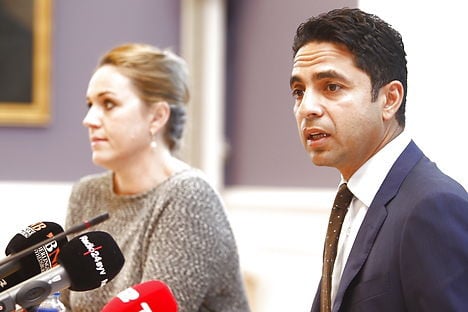What to do with France's returning jihadists?

From banishing them to a notorious island in the Atlantic Ocean to re-integrating them into society, French politicians are battling to come up with the best solution for the hundreds of jihadists returning to France from the Middle East.
As France desperately tries to figure out what to do with hundreds of its citizens when and if they return radicalised from jihad in the Middle East, one far-right politician has suggested reopening the notorious Devil’s Island penal colony to house them.
There is little chance the government will agree to reuse the island off the coast of South America whose most famous prisoner was Captain Alfred Dreyfus, whose wrongful treason conviction more than a century ago sparked one of France’s most tense political dramas.
But for the moment it appears to have no clear strategy on the issue whose urgency was highlighted by the news this week that two young Frenchmen were among the executioners of Syrian prisoners and a US aid worker in the latest Islamic State video.
Despite the urgency and the concern over the perceived danger posed by returning jihadists, there remains no official plan to work on “deradicalising” those who have fought in the Middle East and who may be tempted to return and carry out attacks on French soil.
One expert told The Local this week that France's approach remains too one dimensional and too tied to the law.
“In France we have an essentially judicial approach. We need a more psycho-social approach,” Séverine Labat, an expert on Islamism at the CNRS research organisation, told The Local.
'We cannot treat them as common law citizens'
France, like Britain, takes a hard line on those who have actually travelled to the conflict zone.
A 24-year-old man last week became the first French person to be convicted of joining the jihad overseas and was given a seven years in prison, the maximum sentence possible under recently introduced legislation.
Those laws also aim to stop aspiring jihadists from travelling by giving authorities powers to temporarily confiscate their passports.
And they provide strategies to help worried parents spot signs that their children are being radicalised, and try to break the fascination with jihad picked up from online propaganda before it turns into active engagement.
The government has also set up a telephone hotline for worried relatives of those who might be tempted to join the thousands of European volunteers who have already signed up for jihad in Syria and Iraq.
Opposition politicians have been lining up to say that the government needs to come up with a better plan to either punish returning jihadists more severely or make efforts to reintegrate them into society.
Valérie Pécresse, a conservative former minister, has called on the Socialist government to set up “deradicalisation” centres such as exist in Denmark.
“When these jihadists return to France, we cannot treat them as common law citizens. We need to open ‘deindoctrination’ centres,” she told France Info radio, adding that they must be kept away from regular prisons where they would likely “contaminate” other inmates.
Denmark has been at the forefront of EU experiments in rehabilitating young people seduced by militant Islam since it began a pilot scheme in 2009.
Rather than being thrown in jail, Muslim fighters returning from jihad are offered counseling and jobs or university places. Danish authorities have brought together teachers, police, social services and religious leaders to help identify and target problem cases.
 France’s far-right Front National leader Marine Le Pen unsurprisingly takes one of the toughest lines on French jihadists.
Reacting to the two young Frenchmen seen this week taking part in the IS beheadings, she said that they should be “judged (in France) in absentia and stripped of their nationality.”
A repatriated French fighter, who had ties with the Islamic State, is currently in custody in Belgium accused of killing four people in an attack on the Jewish Museum in Brussels in May.
Security services said in early November that several terrorist plots against France have been foiled in recent months, including one planned to target the famous Nice Carnival.
They pointed out that some of them had been planned by French citizens who had recently returned from the Middle East.
More than a thousand French are believed to be involved in some way with jihad, with nearly 400 thought to be fighting on the frontlines.
France’s far-right Front National leader Marine Le Pen unsurprisingly takes one of the toughest lines on French jihadists.
Reacting to the two young Frenchmen seen this week taking part in the IS beheadings, she said that they should be “judged (in France) in absentia and stripped of their nationality.”
A repatriated French fighter, who had ties with the Islamic State, is currently in custody in Belgium accused of killing four people in an attack on the Jewish Museum in Brussels in May.
Security services said in early November that several terrorist plots against France have been foiled in recent months, including one planned to target the famous Nice Carnival.
They pointed out that some of them had been planned by French citizens who had recently returned from the Middle East.
More than a thousand French are believed to be involved in some way with jihad, with nearly 400 thought to be fighting on the frontlines.
But Séverine Labat of the CNRS said that the threat of attacks on France was limited for the moment.
“The priority at the moment for the Islamic State at the moment is regional - to consolidate what they have in the Middle East.
"It’s impossible to predict what will happen in the future of course, but for the moment I don’t think that their priority is attacks in Europe,” she said.
by Rory Mulholland
Comments
See Also
As France desperately tries to figure out what to do with hundreds of its citizens when and if they return radicalised from jihad in the Middle East, one far-right politician has suggested reopening the notorious Devil’s Island penal colony to house them.
There is little chance the government will agree to reuse the island off the coast of South America whose most famous prisoner was Captain Alfred Dreyfus, whose wrongful treason conviction more than a century ago sparked one of France’s most tense political dramas.
But for the moment it appears to have no clear strategy on the issue whose urgency was highlighted by the news this week that two young Frenchmen were among the executioners of Syrian prisoners and a US aid worker in the latest Islamic State video.
Despite the urgency and the concern over the perceived danger posed by returning jihadists, there remains no official plan to work on “deradicalising” those who have fought in the Middle East and who may be tempted to return and carry out attacks on French soil.
One expert told The Local this week that France's approach remains too one dimensional and too tied to the law.
“In France we have an essentially judicial approach. We need a more psycho-social approach,” Séverine Labat, an expert on Islamism at the CNRS research organisation, told The Local.
'We cannot treat them as common law citizens'
France, like Britain, takes a hard line on those who have actually travelled to the conflict zone.
A 24-year-old man last week became the first French person to be convicted of joining the jihad overseas and was given a seven years in prison, the maximum sentence possible under recently introduced legislation.
Those laws also aim to stop aspiring jihadists from travelling by giving authorities powers to temporarily confiscate their passports.
And they provide strategies to help worried parents spot signs that their children are being radicalised, and try to break the fascination with jihad picked up from online propaganda before it turns into active engagement.
The government has also set up a telephone hotline for worried relatives of those who might be tempted to join the thousands of European volunteers who have already signed up for jihad in Syria and Iraq.
Opposition politicians have been lining up to say that the government needs to come up with a better plan to either punish returning jihadists more severely or make efforts to reintegrate them into society.
Valérie Pécresse, a conservative former minister, has called on the Socialist government to set up “deradicalisation” centres such as exist in Denmark.

But Séverine Labat of the CNRS said that the threat of attacks on France was limited for the moment.
“The priority at the moment for the Islamic State at the moment is regional - to consolidate what they have in the Middle East.
"It’s impossible to predict what will happen in the future of course, but for the moment I don’t think that their priority is attacks in Europe,” she said.
by Rory Mulholland
Join the conversation in our comments section below. Share your own views and experience and if you have a question or suggestion for our journalists then email us at [email protected].
Please keep comments civil, constructive and on topic – and make sure to read our terms of use before getting involved.
Please log in here to leave a comment.